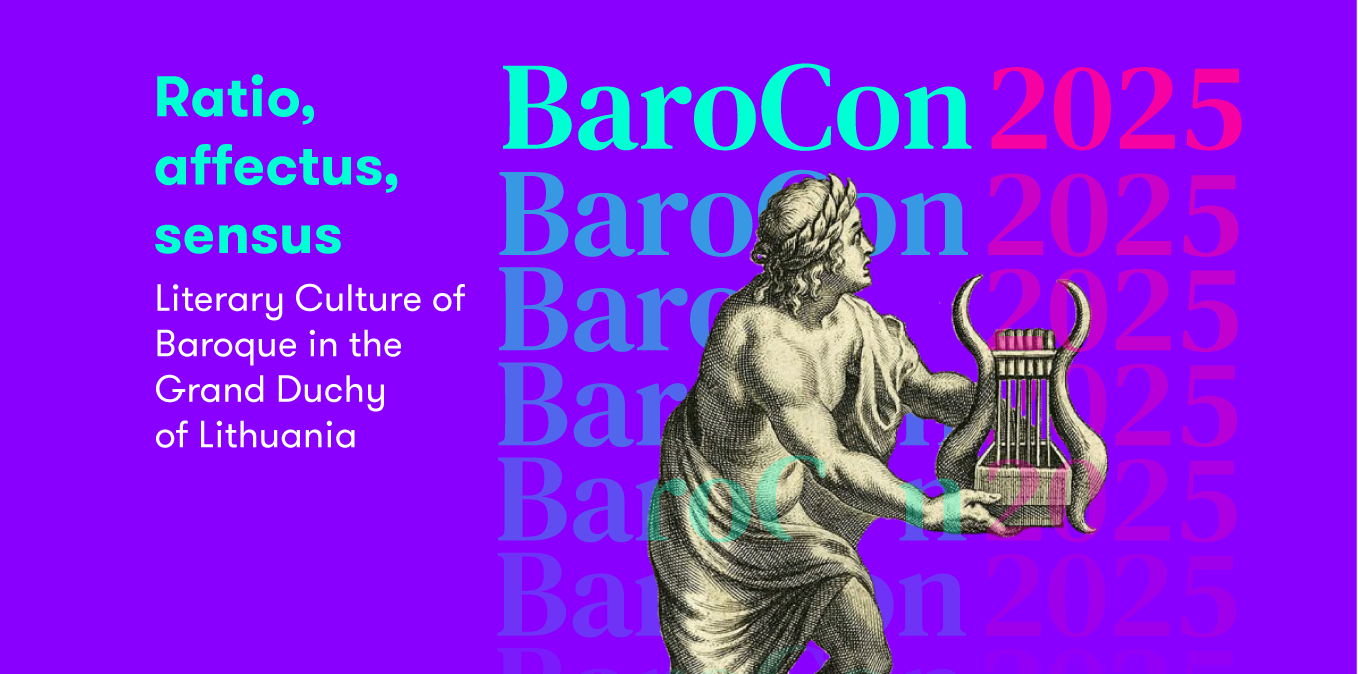Ratio, affectus, sensus: Literatūrinė baroko kultūra Lietuvos Didžiojoje Kunigaikštystėje
Prieš 400 metų buvo pirmąkart buvo išleistas garsiausias Motiejaus Kazimiero Sarbievijaus lotyniškos poezijos rinkinys Lyricorum libri tres (1625 m.), dėl to 2025-ieji metai Lietuvoje paskelbti Baroko literatūros metais. Abiejų Tautų Respublikos neolotyniškasis jėzuitų poetas Sarbievijus buvo vadinamas krikščioniškuoju arba sarmatiškuoju Horacijumi. Jo teorinės mintys apie poeziją ir retoriką tebėra vertinamos ir įkvėpia vis naujus Baroko literatūros ir autorių tyrimus, tad šis jubiliejus suteikia galimybę patyrinėti Baroko literatūrinės kultūros mastą ir įvairovę, kuri pastaraisiais dešimtmečiais sulaukė didelio susidomėjimo tiek akademiniame pasaulyje, tiek populiariojoje kultūroje. Šia proga Lietuvių literatūros ir tautosakos institutas bei Vilniaus universiteto Filologijos fakultetas rengia tarptautinę mokslinę konferenciją „Ratio, affectus, sensus: Literatūrinė baroko kultūra Lietuvos Didžiojoje Kunigaikštystėje“, kuri vyks 2025 m. rugsėjo 25–27 d. barokiniame Vilniuje.
Daugiadisciplininės konferencijos tikslas – paskatinti diskusiją apie „ilgojo XVII a.“ (nuo XVI a. pabaigos iki XVIII a. vidurio) literatūrinę kultūrą Lietuvos Didžiojoje Kunigaikštystėje. Šis istorinis laikotarpis, susijęs su dramatiškais pokyčiais ir visuotine kultūros krize, dažnai apibūdinamas prieštaringai, nuolatinėje įtampoje tarp proto ir jausmų, griežtos struktūros ir aistrų bei pan. Atsižvelgdami į šį prieštaravimą, kviečiame nagrinėti Baroko literatūrą ir jos raišką per dinamiškos proto (ratio), emocijų (affectus) ir jausmų (sensus) sąveikos prizmę, kurią galima įžvelgti įvairiuose šio laikotarpio žanruose ir vėlesnėje jų recepcijoje, išlaikančioje barokinę dvasią.
Kviestiniai pranešėjai

Ona Dilytė-Čiurinskienė
Vyr. mokslo darbuotoja, LLTI
Prof. Stephen Harrison
Oksfordo universiteto profesorius
Krzysztof Fordoński
An Ode 'with Large Additions': Isaac Watts 'Translates from Casimire’s Book IV Ode 4'
Krzysztof Fordoński
Uniwersytet Warszawski
An Ode 'with Large Additions': Isaac Watts Translates from Casimire’s Book IV Ode 4
Keywords: Sarbiewski, Isaac Watts, translation, emulation, translation of poetry
The celebrated English hymnographer Isaac Watts (1674-1748) first encountered the poetry of Maciej Kazimierz Sarbiewski during his elementary education at Southampton. The fascination with an exotic Polish and, which is far more striking when we think of the devout Protestant Watts, Roman Catholic Jesuit poet continued for a large part of Watts’ life. The practical effect of the fascination are thirteen surviving translations. Watts found Sarbiewski so inspiring that he adapted one of his odes as a hymn intended for his congregation although, apparently aware that Jesuit poetry could raise many Puritan eyebrows, he did not reveal the original author in the publication. Usually, however, he made the connection clear and he expressed his admiration for Sarbiewski in the preface to his collection of poems Horae Lyricae. The present paper deals with the most striking and free of the thirteen translations – “The celebrated Victory of the Poles, over Osman the Turkish Emperor, in the Dacian battle Translated from Casimire. Book IV. Ode 4. with large Additions”. Watts first published the translation in 1706 edition of Horae Lyricae but he kept on returning to the poem, expanding the translation (or perhaps emulation) almost with every one of the seven editions of the collection published in his lifetime. Ultimately, the poem which in the original consists of 92 lines grew to 227 lines. The paper shall briefly present Isaac Watts, probably the most influential of English translators of Sarbiewski in the first half of the 18th century. It will then attempt to place Watts’ translation strategies within the context of translation practice of the Augustan Age. Ultimately, it will offer an analysis of the “large additions”, alterations introduced in the original text by the English poet.

